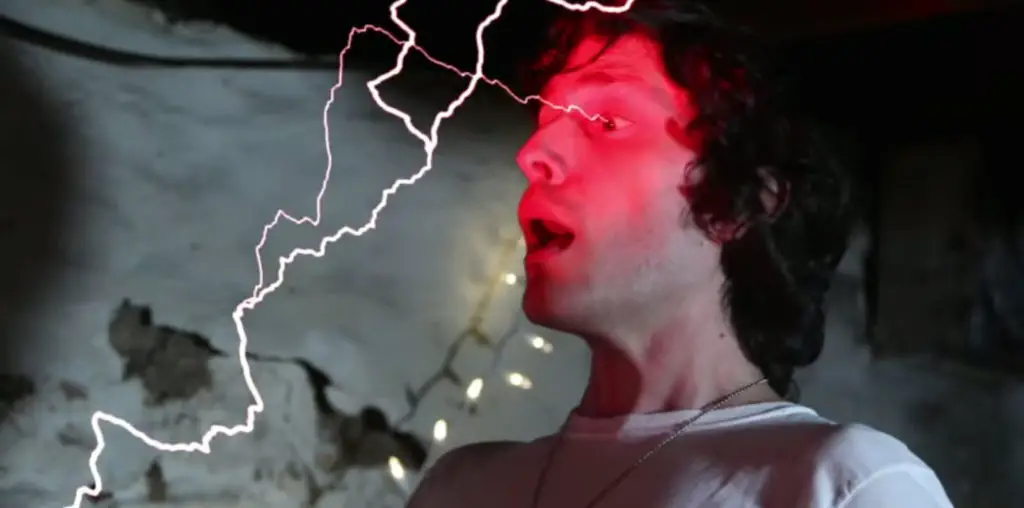
Feeling lost and down on his luck, a struggling musician gives up the glitzy, cutthroat L.A. scene and returns to his hometown in Kansas, where he must come to terms with the death of his father and discover his true self in both an artistic and spiritual sense.
That sounds an awful lot like the logline of a Cameron Crowe movie – it’s easy to imagine a good-looking Chris Pine-type playing the lead, surrounded by a plethora of colorful down-home supporting characters providing comic relief and an emotional breakthrough or two – but as Hollywood as the setup might sound, it’s actually the basis for a documentary spotlighting singer/songwriter Jonathan Fleig.
Road to NowHere, co-directed by Fleig and his producer, Brian D. Hardin, chronicles Fleig’s attempt to record songs for an upcoming album live, mostly outdoors, in several non-studio locations in his home state. The technical and logistical challenges of doing that could potentially be worth documenting in and of themselves, but as the title’s distinctive capitalization suggests, the film is far more concerned with Fleig’s personal journey of self-actualization and discovering his place in the universe.

“The film has the earnestness of the feel-good Cameron Crowe flick…”
That focus works both for and against Road to NowHere as a documentary. In between performances of his (often disarmingly good) songs – mostly wistful roots-rock tunes flecked with folk, blues, and even gospel – Fleig appears in confessional segments in which he grapples with his grief over the loss of his dad, the challenges of making a living playing music, and trying to achieve a state of emotional well-being. He’s likeable and engaging enough as an interview subject, but a little of this goes a long way – the film’s notions about learning to live in the moment, chasing dreams, and moving on from the past aren’t exactly revelatory, and at times Road to NowHere leans a little too hard on familiar self-help platitudes instead of providing real insight into the man at its center.
Compounding this issue is that fact that Fleig’s perspective is the only one that the film ever really presents; there’s an entire segment dedicated to his ever-supportive wife, for example, but she never appears onscreen. Really, the observations of anyone other than the film’s subject himself – a bandmate, a family member or friend, a fan, etc. – would flesh out its portrayal of Fleig as an artist and as a person in important ways that remain frustratingly unaddressed. Yes, Road to NowHere is a deeply personal movie, but it’s much harder for an audience to accept that a person has changed and grown when the only real evidence provided is him telling us that he’s done so.
More successful and effective overall are the film’s the musical segments, which juxtapose footage of Fleig and his band’s recording sessions in places like a small town’s main street, a pastoral park, and a river overpass with music video-like segments of Fleig lip-syncing his songs, framed dramatically with lovely (if on-the-nose) Kansas sunsets as his backdrop. The former of those is engaging while the latter is somewhat distracting; the film in general works better as a document of an unorthodox recording/performance project than it does as a long-form music video. That performance footage could be edited a little less haphazardly to better fit the songs’ rhythms and flow, but still, there’s real joy to be found in seeing Fleig do what he does best, surrounded by his band in an impromptu outdoor recording studio, fans in camp chairs looking on admiringly.
It’s a solo performance, though, in which Fleig and his film come closest to achieving the transcendence they’re obviously after. In the middle of a rainstorm, Fleig and Hardin set up their recording and filming equipment by an old stone church set amongst a seemingly endless prairie; Fleig performs a plaintive, heartfelt song about his father as the sun slowly begins to wash the rain away. The scene’s beauty really does resonate, and while costly for the filmmakers – as one might expect, not all of their equipment survived the soaking – it provides a centerpiece that almost by itself makes the film worth seeing.
If nothing else, Road to NowHere serves as a fine showcase for Fleig’s music; the songs stick in a way that too much of the soul-searching stuff really doesn’t. The film has the earnestness of the feel-good Cameron Crowe flick that its premise resembles, but Fleig’s attempts to “find himself” don’t pay off in a tangible enough way, and he doesn’t seem terribly different at the end of the doc than he does in its opening sequences. It’s hard not to wish the guy well, but the songs are a much stronger reflection of his spiritual and emotional struggles than the one that the film – no matter how candidly Fleig talks to the camera – is able to get across.

Road to NowHere (2014). Written, produced and directed by Jonathan Fleig and Brian D. Hardin. Starring Jonathan Fleig, Colin Jones, Charlie Laughridge, Ben Russell, Tom Scripter, Mike Weaver.
2 stars out of 5
More information can be found on the official website for Road to NowHere.


